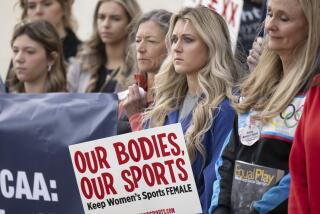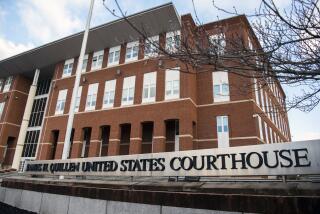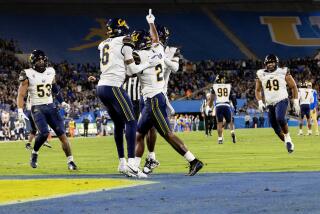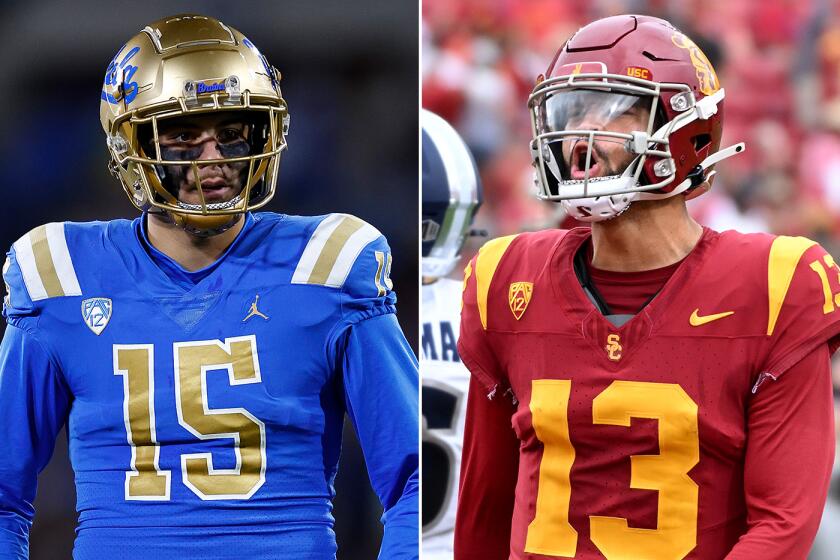As Todd McNair’s lawsuit against NCAA nears trial, both sides are sparring over another set of emails and documents
Two weeks before former USC running backs coach Todd McNair’s defamation lawsuit against the NCAA is scheduled for trial, the parties are sparring over more than 1,000 emails and other documents the organization wants to redact or withhold.
The cache includes scores of emails to or from members of the NCAA’s Committee on Infractions that sanctioned USC and McNair in the aftermath of the Reggie Bush extra benefits scandal.
Though the NCAA has handed over more than 150,000 pages of documents in the lawsuit, the dispute over the remaining emails, reports, spreadsheets and PowerPoint presentations underscores the contentious nature of the proceedings.
“Simply put, there was no attorney-client relationship between the independent committee members and counsel for the NCAA,” McNair’s attorneys wrote last month in a motion in Los Angeles County Superior Court to compel the NCAA to produce many of the documents. “It is the NCAA’s burden to demonstrate that the documents at issue are privileged and it has not done so.”
The NCAA wants to redact portions of 351 emails sent between 2010 and 2017 in addition to withholding an additional 886 documents for reasons including attorney-client privilege or their relevance to the case.
Among the documents the NCAA seeks to keep private are three emails from Shep Cooper, the infractions committee liaison, to committee chairman Paul Dee and members Brian Halloran and Rodney Uphoff sent Aug. 18, 2010. That was the day after McNair’s appeal of the committee’s finding he engaged in “unethical conduct” became public.
As with the other documents — they include emails to or from NCAA President Mark Emmert, public relations staffers and enforcement staff — only the file type, sender, recipients and date are included in court records. There’s no subject line or details about the contents of the emails.
The NCAA’s explanation for keeping Cooper’s three emails private is similar to others in two logs of documents that span more than 200 pages: attorney-client privilege and work-product communication “reflecting legal advice regarding ongoing infractions matter(s).”
Though the exchange didn’t include an attorney representing the men, the NCAA claims the communication remains privileged. That’s an argument the organization leans on for many of the documents in question.
“Our position is that those communications reflect or convey the advice of an attorney and are therefore privileged,” Julie Rubenstein, part of the NCAA’s legal team, wrote in an email to McNair attorney Christian Nickerson last month.
Another point of contention: large batches of emails involving NCAA attorneys sent or received by infractions committee members and others outside the organization.
“It is our position … that the documents were either not communicated to an attorney or were communicated to a committee member outside the NCAA and are therefore not privileged,” Nickerson wrote in an email to Rubenstein.
She disagreed, writing that the privilege remained even though the infractions committee members aren’t NCAA employees.
Emails and other internal documents have already been a point of contention in the case. The NCAA fought for years to keep more than 700 pages of deposition excerpts, phone records and emails between infractions committee members private before a three-justice panel in California’s 2nd District Court of Appeal rejected the effort in 2015.
Those documents, which became public later that year, included an email from Cooper to Uphoff that was critical of McNair.
“As [infractions committee member] Roscoe [Howard] said at some point during the Sunday morning deliberations, individuals like McNair shouldn’t be coaching at ANY level, and to think that he is at one of the premier college athletics programs in the country is outrageous,” Cooper wrote on Feb. 22, 2010. “He’s a lying, morally bankrupt criminal, in my view, and a hypocrite of the highest order.”
The NCAA wants more documents from McNair before trial, too. It filed a motion seeking an unredacted copy of his settlement agreement with USC. The school didn’t renew McNair’s contract after the infractions committee issued its report in 2010.
Twitter: @nathanfenno
More to Read
Get our high school sports newsletter
Prep Rally is devoted to the SoCal high school sports experience, bringing you scores, stories and a behind-the-scenes look at what makes prep sports so popular.
You may occasionally receive promotional content from the Los Angeles Times.







